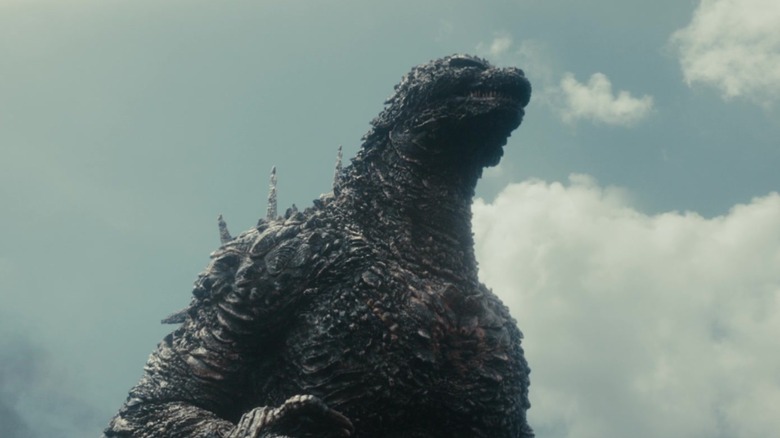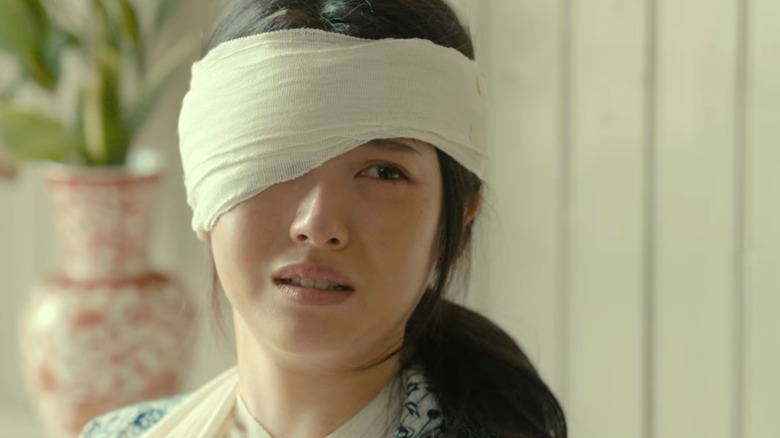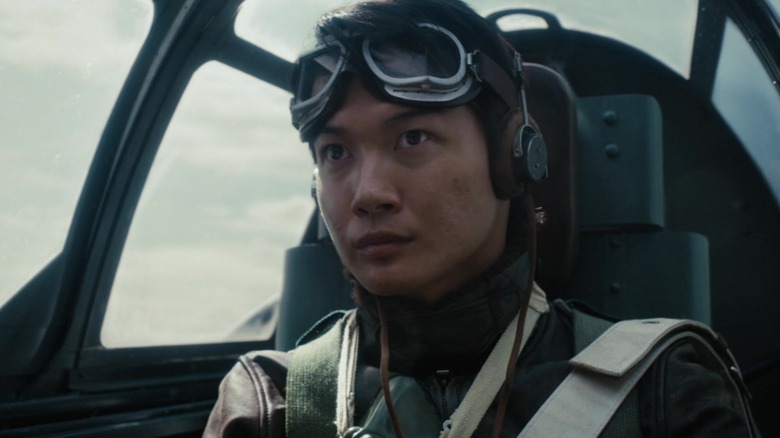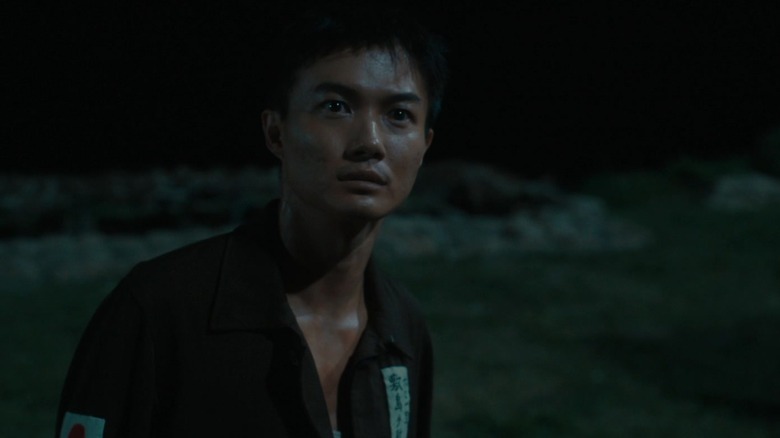Godzilla Minus One's English Dub Is The Worst Way To Watch A Great Movie
This post contains spoilers for "Godzilla Minus One."
Whether you watch them or not, dubbed movies are a part of life. International dubs are more accessible for viewers with dyslexia, vision problems, or processing disorders, and they're a great early entry point for young kids experiencing world cinema for the first time. They're useful for all sorts of reasons, and the best of them feature strong performances that add additional layers to already-compelling stories. So, when a good movie gets a bad dub, it should be everyone's problem, and that seems to be the case for one of the best films of 2023: "Godzilla Minus One."
The latest Godzilla film from Toho Studios made a kaiju-sized impact when it debuted in theaters last December, earning an impressive $115 million worldwide against a super-lean budget and becoming the highest-grossing Japanese Godzilla movie ever made. The movie also became the first in the franchise to win an Oscar, taking home the trophy for Best Visual Effects –- a victory the film's hardworking effects team undeniably deserved. The movie has earned plenty of praise for its visuals, but the script of "Godzilla Minus One," penned by director Takashi Yamazaki, is equally worthy of attention. That's why the new dub that's autoplaying for viewers catching the movie on Netflix feels so egregious. It changes at least one key line of the screenplay, draining the film's climax and other key moments of their raw, goosebump-inducing emotion.
The English dub changes the film's last line
Twitter X user @14_kaiju pointed out one of the dub's most upsetting changes in a post made Tuesday, in which they note that the film's very last line is worded differently in the English-dubbed version of the film available on Netflix. This scene comes after Godzilla has been defeated by a group of determined civilians whose victory was assured when our hero, Kōichi Shikishima (Ryunosuke Kamiki), flies a plane full of explosives straight into the creature's mouth. A former kamikaze pilot suffering from debilitating survivor's guilt, Shikishima is sure that his love Noriko (Minami Hamabe) is dead, and plans to kill himself to save the rest of Tokyo. At the last minute, though, he decides to live, and afterwards hears the news that Noriko actually survived the kaiju blast he thought had killed her. The pair reunite, and she tearfully asks him, "Is your war finally over?"
Except, that's not what Noriko says in the English dubbed version of the film. Instead, she asks, "Can this war of yours finally be done?" It's a subtle difference when looking at the line in a vacuum, but tonally and in context, it makes a major difference. The original subtitled line is poetic and hopeful, and it frames the private war Shikishima has been waging –- against his own grief, depression, and guilt –- as something that eventually passed, like dark storm clouds clearing from the sky. The English-language line, however, sounds more like a plea, as if she's asking Shikishima to get over his baggage. What's more, "your war" acknowledges the personal nature of Noriko's partner's pain, while "this war of yours" comes across as impersonal and disconnected from the emotion of the scene. This surely wasn't the intention of the writers responsible for this translation, but it softens the impact of the film's final moment regardless.
Godzilla films have been losing something in translation for decades now
Another scene that doesn't hit as hard in the dubbed version comes part way through the movie, when Shikishima thinks he's lost Noriko after a massive, harrowing Godzilla attack. The scene ends with Kamiki screaming in grief as black rain, a potentially radiation-filled side effect of Godzilla's carnage, splatters his face while the camera pulls back into a wider shot. In lesser hands, a scene of a man falling to his knees to howl in grief might feel cliched, but it's executed perfectly here, and the film's themes of nuclear destruction in Japan are more chilling than ever. When I watched the scene, it left me with my heart in my throat, but in the Netflix dub, the scream is for some reason dubbed over by an English-speaking actor, as user @14_kaiju also pointed out on Twitter X. "Never Have I Ever" star Darren Barnet plays Shikishima in this version of the film, and while Barnet does an admirable job in other sequences, some viewers clearly think this dubbed scream turns a dark moment inadvertently funny.
To be fair to the voice actors and translators that made this dub happen, there are aspects of this version of the film that work, and the occasional awkward moment or tonal mismatch still feels like a vast improvement upon Godzilla's long history of losing something in translation when repackaged for American audiences. The 1954 original is the most egregious example of this phenomenon, as that movie was released in the U.S. under a totally different title ("Godzilla, King of the Monsters!"), stripped of most of its political commentary, and cluttered with the addition of an entirely new character who didn't even appear in the Japanese version of the film. The English dub of that movie was also apparently abysmal.
The subs versus dubs debate rages on
The "Godzilla Minus One" dub is by no means unwatchable, but its shortcomings feel especially glaring given that Netflix, in my experience, often auto-plays films and shows with the dubbed version rather than subtitles. Given that IndieWire is reporting that this movie just made history by simultaneously topping the Netflix and paid video on demand charts, that's a whole lot of eyes on the movie, and it seems likely that plenty of viewers simply won't take the time to switch from the dubbed version to the original Japanese. Frankly, the dub-first approach from Netflix feels like an insult to viewers' attention spans, an assumption that the average viewer watching an international film plans to scroll through their phone or otherwise half-engage while watching, thus requiring a dub instead of subtitles.
Fans of the film –- including actor and comedian Simon Pegg –- have already taken to social media to speak out about the "Godzilla Minus One" dub situation. Pegg reportedly shared a video to Instagram (it's now seemingly unavailable, but was also shared to Twitter X by @14_kaiju) noting that "If you are going to watch 'Godzilla Minus One,' by the way ... watch it in Japanese. Don't watch it auto-dubbed." The actor seems to be a subtitle purist, as he recommends never watching dubs and always choosing subtitles to better take in "the original performances and the original language."
On the other side of this argument are fans of the film arguing that dubs are necessary for accessibility, and that being dismissive of a dub is disrespectful to voice actors who worked hard on them. "I prefer subs, but I'm also very fond of many English dubbed performances in Miyazaki films," user @saepurple noted in a reply, commending the English-language voice casts of Studio Ghibli's "Howl's Moving Castle" and "The Boy and the Heron," which starred Christian Bale and Robert Pattinson, respectively. It's clear that the discourse surrounding dubbed films and subtitles will continue to rage on with strong –- and valid –- opinions on both sides. It's also clear that "Godzilla Minus One" deserves a dub that doesn't lessen its incredible impact.



